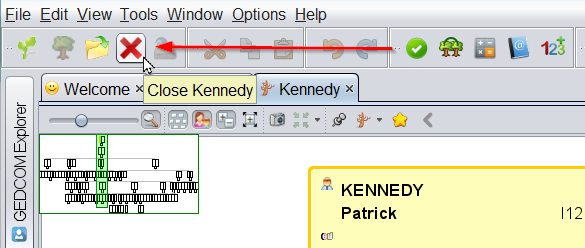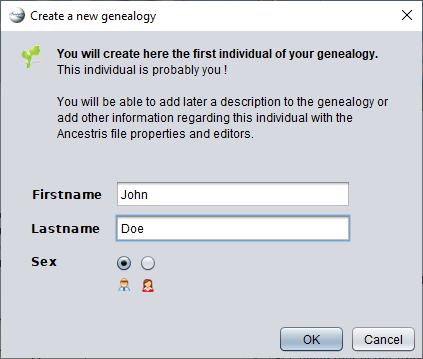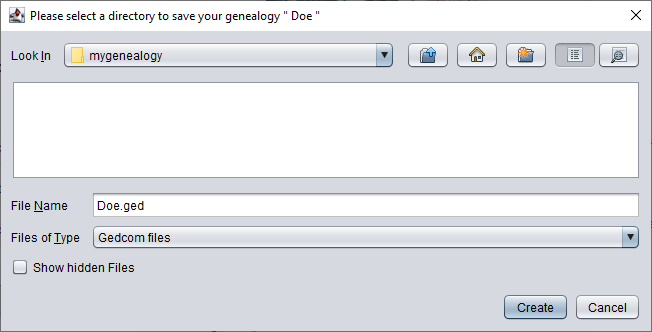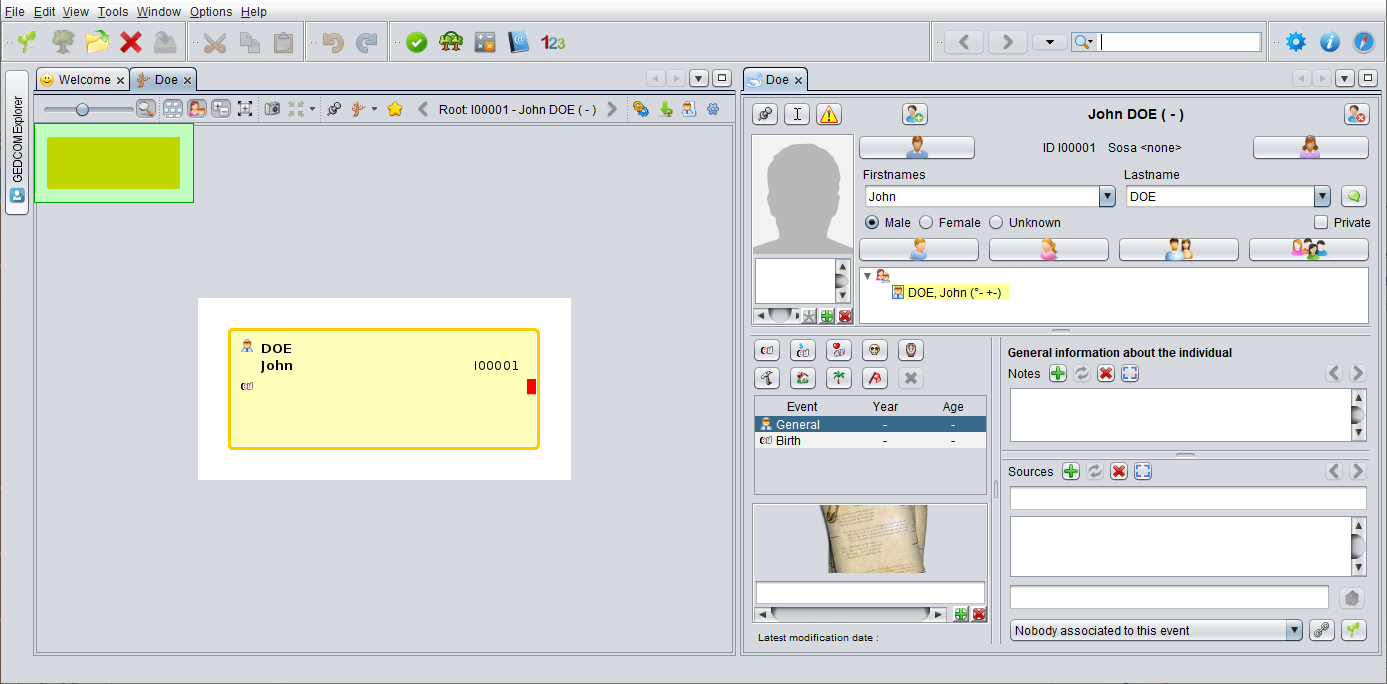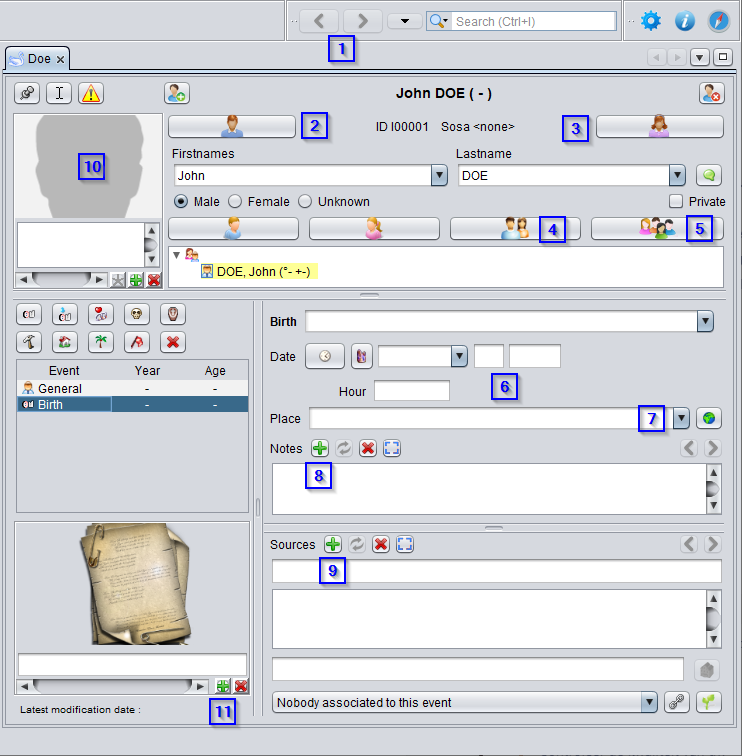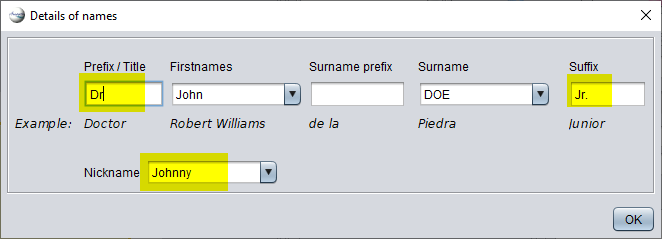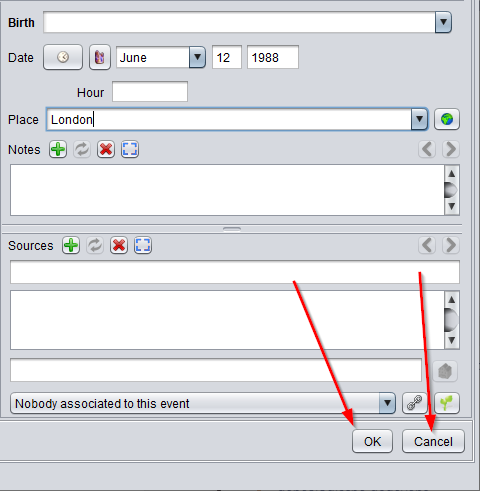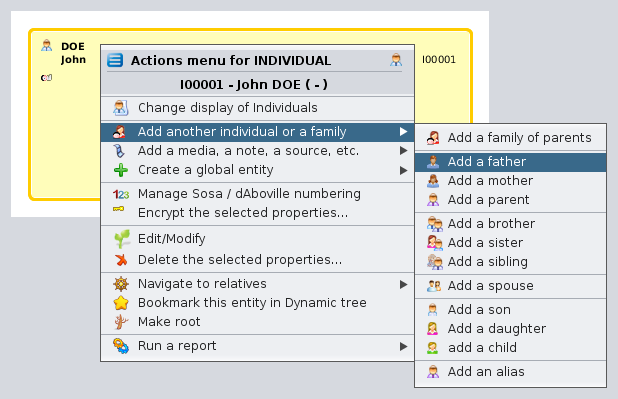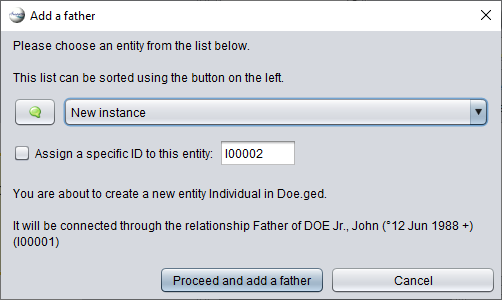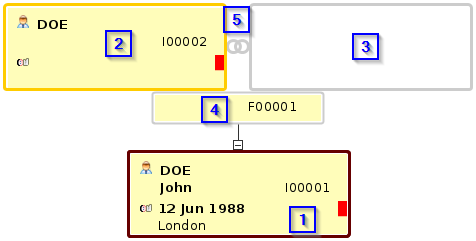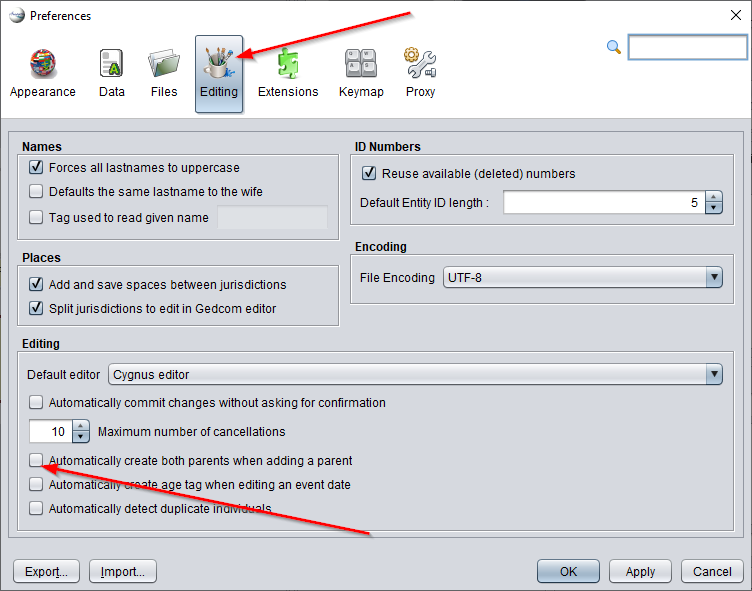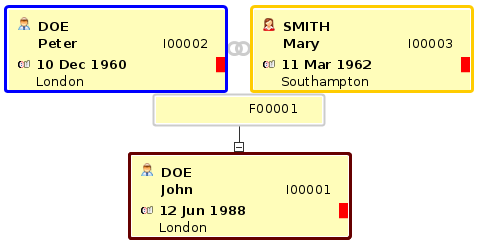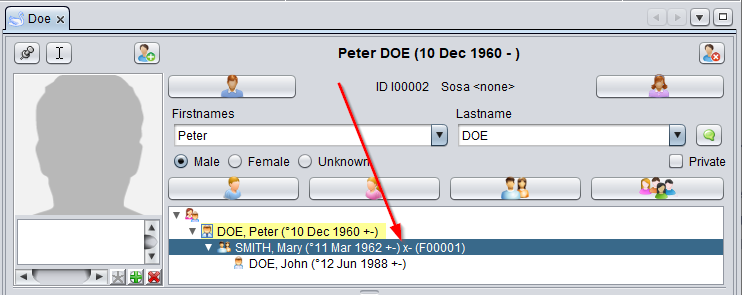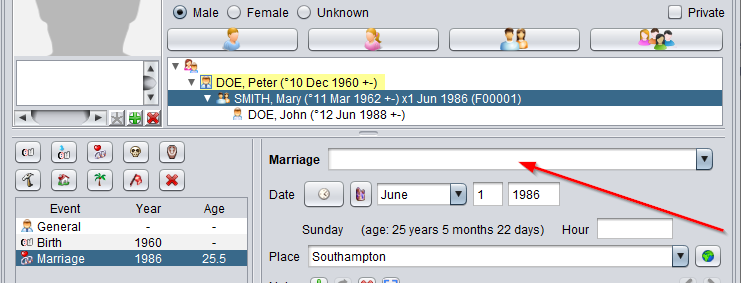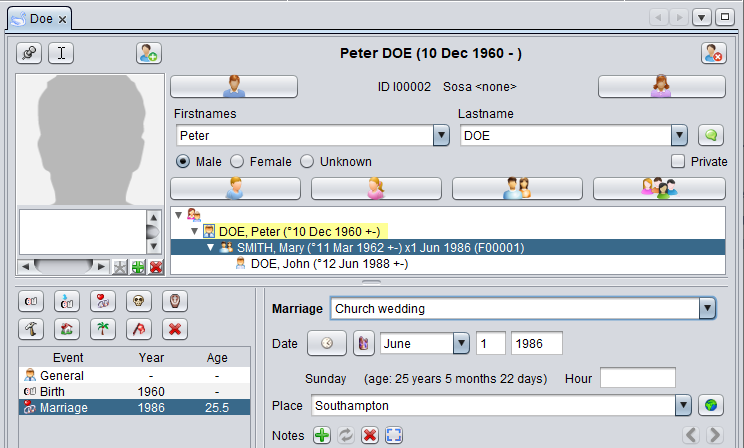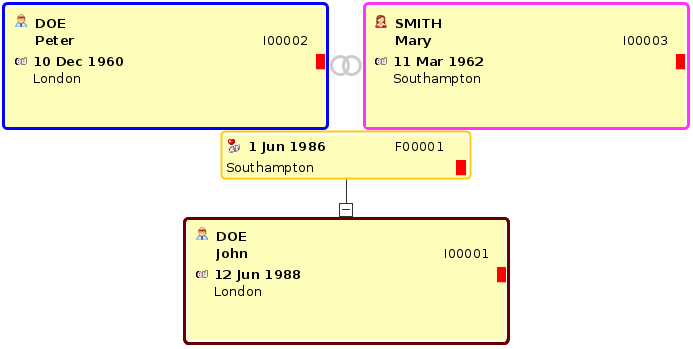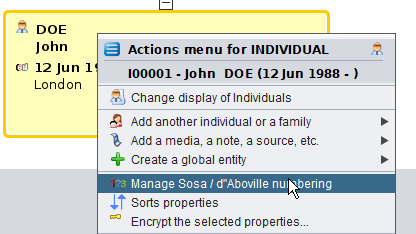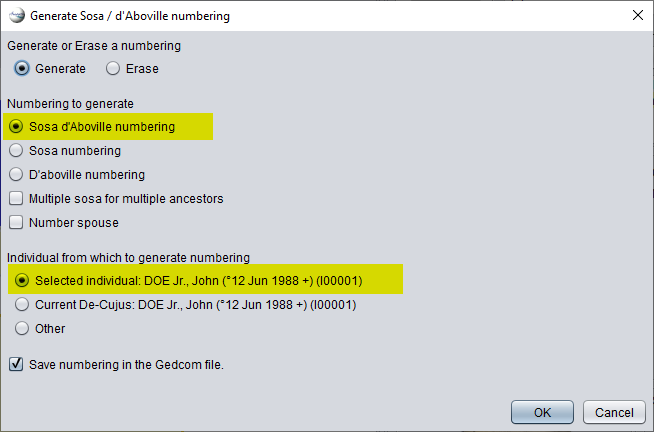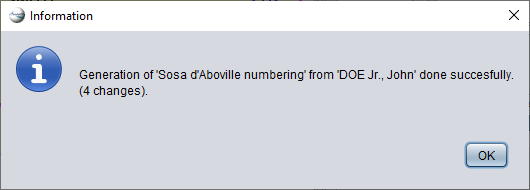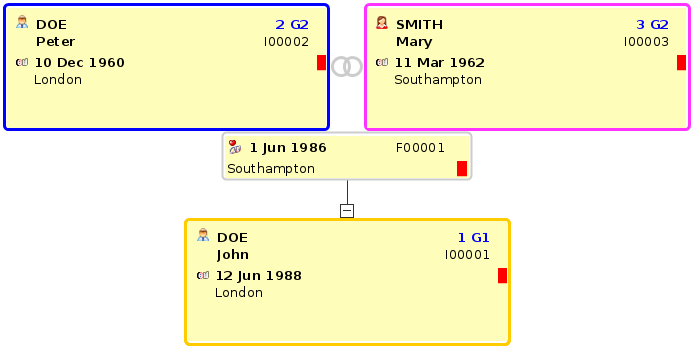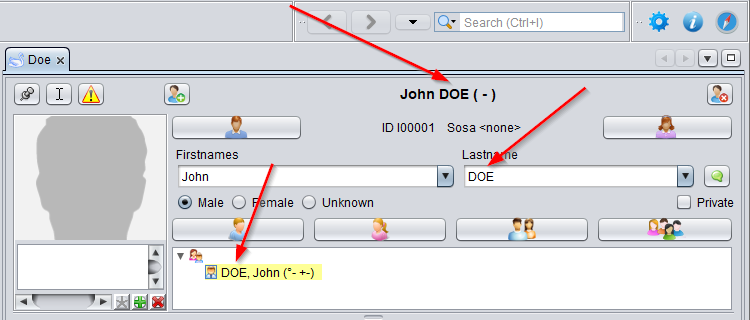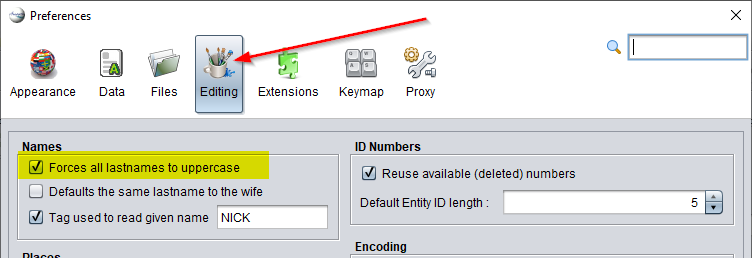8.2. Maak Nieuwe Stamboom
Create your genealogy
You will see how simple it is to create a genealogy from scratch with Ancestris. You will create a first individual, the parents and close family like children and brothers and sisters, thus having your first genealogical tree with one or two generations.
Creating a genealogy usually starts with creating the first person and specifying information like the birth date and place for instance. Then other persons are added, such as the parents, brothers and sisters, cousins and grandparenst. A new person is always linked to a person already in the tree, these are the relationships. For eaxmple parent - child, or partner1 - partner2. In this way you will continue to expand the tree.
Well, with Ancestris, you can exactly do the same!
Create the first individual
During the guided tour, we used the Kennedy genealogy, so theKennedy file. This is an example of a genealogy supplied with Ancestris.
If this tree is still open, we first have to close it. To close Kennedy, just hold your mouse over the red cross on the toolbar at the top of the window. (Do not click yet!)
Below the cross you will see a yellow hint appear, with the name of the Gedcom file that is going to be closed. If this is not the one you want to close, you must first select an Ancestris window belonging to the Kennedy file. For instance the dynamic tree of Kennedy, as in this example. Then you hold your mouse over the red cross again, to check if it is the right one to close. If so, close it.
And now, let's create your own genealogy. If the Welcome page is still visible, click the button Create a genealogy or click  at the left on the toolbar.
at the left on the toolbar.
The following window appears.
Fill in the name "John Doe", male, and click OK. The next window appears:
Ancestris will then ask you for the location and file name to save your genealogy information.
As you can see, the information is directly saved as a Gedcom file. Gedcom files have the extension ".ged". The filename Ancestris chooses, is the lastname of the person that was just filled in, (Doe), so the file is named "Doe.ged". Navigate to the correct directory. Press Create to save. That's it.
Ancestris will now show a genealogy tree in the dynamic tree view on the left side of the window. This tree is made up of one person only: you.
On the right hand side, the Cygnus editor is also opened. The Cygnus editor shows the detailed information of the person currently selected in the dynamic tree view on the left. (Maybe on your screen the last name is written as "DOE". So in all capitals. The xplanation of this you will find near the end of this page.
Short summary of Cygnus fields and buttons:
Click here for an explanation of the numbers
Explanation of the numbering:
- Buttons that scroll forward or backward through previous content in this editor. (previous persons)
- Button to create the father.
- Button to create the mother.
- Button to create the partner.
- Button with which the children can be created.
- Birth data can be entered in these fields. For example the date and possibly time.
- Place of birth field. This field can be expanded to search in existing places. The green globe can also be used to transfer data from a map.
- Any notes can be created via the green plus.
- Sources can be added via the green plus. Including any associated data.
- A photo or photos can be added here.
- Scans of deeds and the like can be added with the green plus. Including all associated data.
We will not go into much detail here about how to enter things exactly, because you will find that on the "Cygnus Editor" page.
If you want to know the meaning of a button, hold the mouse over the button (or any menuaction), and more information will appear in a popup or Hint-window. That goes for any button on any screen.
With this Cygnus editor you can now complete the missing data, such as the date and time of birth (field 6), your place of birth (field 7). But you can also add a photo (Field 10). You can also add more names:
Click on the green button "Details name", as above, and the Details screen opens::
Here you can enter more names, titles and the like.
Save changes in the Cygnus editor:
As soon as you have entered something, for example the date of birth, or more names or other data, two buttons will appear at the bottom right. OK saves the changes, Cancel cancels them.
Create your parents
Creating parent can be done either from the dynamic tree view or from the Cygnus editor.
In the pedigree overview on the left side of the screen, right-click on the desired person, in this case "John Doe". (For Mac users with 1 mouse button use cntr click) A popup menu will appear:
In the Cygnus editor (as seen below) we use the big button for "Father". This method is faster. The "Father" button is located in the top left of the Cygnus editor screen. (The "Mother" button is on the right)
After clicking the appropriate button, the "Add a father" screen will appear:
You click on "Proceed and add a father". Then your tree will look like this:
In both cases, you get two more boxes in the tree, above your own: These are your parents. Your father (2) is created (yellow), but for your mother (3) only a placeholder (white) is visible. The entity corresponding to her is not yet created.
Click here for an explanation of the numbers
Explanation of the numbering:
- Field of your own. With first name and last name, because they were known. On the right is the internal number assigned to your person, here "I00001" (The I of Individual). The red square on the right means that important information about you is still missing. The small icon on the left under your name means: "Born", which may contain your birth data.
- Your father's field. Only the surname is known here, so the first name is missing. Your father gets number "I00002".
- Your mother's field. All data is still missing.
- Field in which the FAMS (=relationship) data will appear. For now only the relationship number "F00001" (The F comes from Family).
- This is the relationship symbol (2 rings) it stands between both partners of the relationship. The symbol changes when they are divorced.
Ancestris default setting creates only one parent at a time. It could be interesting to try and create both. To do so, go to preferences, using the main menu "Options / Preferences" Choose the Editing tab, or click on  at the top right of the main window.
at the top right of the main window.
On the Preferences screen, select the "Edit" tab, and check the option "Automatically create both parents when adding a parent". Then click OK (at the bottom) to save this change.
On the father's field, the family name is automatically derived from the individual from which the father was created.
Now enter your father's details in the Cygnus editor (name (Peter), date and place of birth, etc.). Click the OK button when you are done to save the data.
To create the mother, right click on the field of "Peter" and choose "Add a partner" from the popup menu. Either you select the field of "John" and click on the corresponding "Mother" button in the Cygnus editor, or you right-click in your own field "John", and then choose in the popup menu: "Add a mother". You fill in her details and click OK.
Create your close relatives
Next you can create your brothers and sisters, and your partner and children, etc. in the same manner.
If you make a mistake, it is always possible to correct the information directly or simply undo the creation of the new individual. To do that you click on the Undo button  on the toolbar at the top of the screen and start over.
on the toolbar at the top of the screen and start over.
Once you have created all the individuals of your close family, just click on your own box to return to yourself.
Add information about your family
Let's suppose you want to enter your parents wedding date.
Click on the family box, the one between yours and your parents's. It is box number F00001 on the Dynamic tree view at the leftside of your screen.
In the Cygnus editor, you will now see your father's information, and Cygnus will select the nuclear family he constitutes with: your mother. (Mary Smith) Note that there is an "x-" in the line (after Mary's date of birth), but that no wedding date has been entered there yet.
From there, click on the "Marriage" button on the Cygnus editor. (The one with two rings)
The marriage event is created. Enter the date and place, if known.
Behind "Marriage" you type what type of wedding event it is (e.g. Church wedding). The first time, with a completely new family tree, you will not see any data yet when you expand this field downwards. So you just fill in "Churche wedding". If later you enter a next marriage, you will see:
So Ancestris remembers which options you have already filled in a previous time. Because next time you enter a wedding type, you can choose from this box, there is less chance of entering errors or deviating texts.
For more information about possible entries for the marriage field, see below under: possible marriage descriptions near the bottom of this page.
After entering all your data, click OK and that's it. Here is the result:
Note there now is a marriage date present after the "x-" (June, 1, 1986), on the line with "Mary Smith".
Here is the current tree:
Sosa Numbering:
Let's now generate the Sosa numbering for this 3 people family.
Right click on the box representing yourself and choose "Manage Sosa / d'Aboville numbering".
A window will open. Just click OK:
Now the Sosa numbering will be created like the following: number 1 for yourself, 2 for your father and 3 for your mother. G1 and G2 codes are the generation numbers.
You should now have something similar to the view below, where the Sosa numbering is visible in every box at the top right corner, above the identification numbers.
This first tree is now finished. Save it on disk by clicking "Save"  on the toolbar.
on the toolbar.
You can now close your genealogy file by clicking the red cross on the toolbar.
If you hadn't saved your data before, a window will poped-up, asking you to save the file.
You will then see the Welcome page again, since it is now the only one opened.
From there, your genealogy will show on the "My Ancestris" tab of the Welcome panel, at the top left on the section "Last opened genealogies".
From now on, you will probably get into the habit of opening your genealogy from the Welcome panel.
If you have created your first family tree according to these steps, you can possibly compare it with the example family tree "Doe-Ancestris.ged" from Ancestris. You can find it in the "/Ancestris/ancestris/exemples/gen-examples/" sub-directory of the directory where you installed your Ancestris program.
Advices before you start your own family tree.
Adopt best practices
If you keep on adding people, very soon you will reach hundreds of records: individuals, families, etc.
We recommend you to adopt a consistent and harmonised way to write the frequently used information, right from the start, such as:
- surnames (1st letter uppercase or not)
- occupation descriptions
- witnesses (use husband's uncle rather than John's uncle) to avoid repeating names
- place names (old spelling or new spelling ?)
- etc.
Another example of this is the type of marriage.
Possible descriptions for marriages (relationships):
- Church wedding
- Civil marriage
- Banns
- Church wedding announcement
- Registered partnership
- Living together
- Unknown relationship
Also, if you have your birth certificate at hand, document it now as a source, and as comprehensively as possible. Ancestris is very good at keeping all detailed information.
Settings (short description ! )
You may have noticed that in your screen, the last name (here "DOE") is shown in uppercase, even though it was entered as "Doe" so lowercase with 1 capital,
This can be configured in Ancestris.
To do this, go to the "Preferences screen", for example via the preferences icon ![]() in the top right corner of the Ancestris screen. As follows:
in the top right corner of the Ancestris screen. As follows:
On the "Editing" tab, you can optionally remove the check mark from "Forces all lastnames to uppercase". For example if you want all names in the entire family tree, to have only the first letter capitalized, it is best to set this before you start your new family tree. So you do not have to make any adjustments afterwards.
Remember: Changing lastnames from all uppercase to First letter uppercase, does not mean Ancestris changes all names already entered.
A detailed explanation of all settings can be found on the page of the "Preferences screen".
Advice: Take your time to see which preferences can be set. This can prevent a lot of changes later on.

